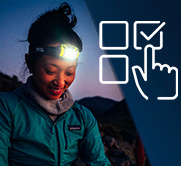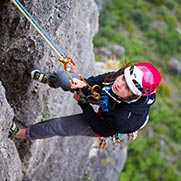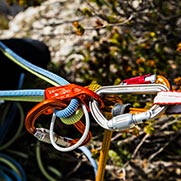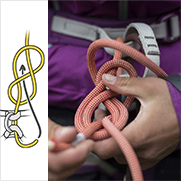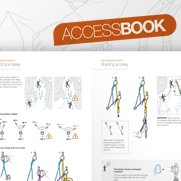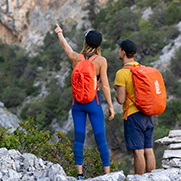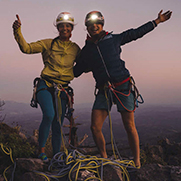UTMB, a quick word with the pros
Xavier Thévenard, Seb Chaigneau, and Maud Gobert were good sports to take time out of their busy training schedules before the 2017 UTMB® this August to answer our questions. They embarked upon this exercise with their usual exuberant enthusiasm, revealing a little bit more about who they are in the process. The topics discussed ranged from managing effort to more personal thoughts that we hope will inspire you in your trail running adventures.
June 15 2017
Running
What is your project for the TDS?
Maud: To start in Courmayeur and arrive in as good a shape as possible!
What is your project for the UTMB?
Xavier: To finish in under 21 hours. That is only 9 minutes faster than my time in 2015. I hope that the 2017 course will be the same as the past two editions.
Seb: To once again circumnavigate this legendary peak that happens to be located right in my backyard...
What do you consider to be your primary strength?
Maud: My tenacity and aggressiveness.
Xavier: Lipolysis, which is clearly an advantage during a 20-hour race.
Seb: I think that experience provides a certain advantage and allows me to enjoy greater perspective relative to the event.
What will be your defining moment during the race?
Maud: Instead of "defining moment," I would say turning point, which will without a doubt be how I manage my race to Bourg-Saint-Maurice, since from Courmayeur, even though distance already covered is considerable, what remains until the finish is extremely difficult. If you are already having a hard time at this point in the race, there is little chance that you'll finish.
Xavier: Arriving in Courmayeur. How strong a runner feels at this point will determine how the rest of the race goes.
Seb: Courmayeur is very important. At this stage in the race you should still be feeling good. It's at this point that the race really begins...
What do you fear the most?
Maud: Warm temps at night. I had a heat stroke 3 years ago, which forced me to drop out of the race even though I was in the lead. Nighttime as well, since the TDS is a race that starts during the day, so the effort during daylight hours obviously has effect on your physical state, on your ability to focus.
Xavier: The level of suffering that I will once again be required to overcome.
Seb: It's difficult to avoid being caught up in the energy and excitement at the start, to successfully focus on one's own pace and race plan. Other than getting injured, this is the part that I fear the most. Otherwise everything should go well.
What advice would you give to other runners?
Maud: Never give up, even when the going gets tough. There are highs and lows, euphoric moments and losses in momentum. All of this is normal. Don't start out too fast and do not set any split times that will cause stress if you are behind your target time.
Xavier: During those low points when your stride and overall coordination suffer, try to remain "smooth and stable," which is why poles are such a great tool for the UTMB by allowing you to stay upright and maintain your pace.
Seb: Just as I said before, focus on yourself and let everyone else do their thing, concentrate only on your own pace so that you don't burn out unnecessarily.
How are you training for your race?
Maud: I cross train by riding my bike for long outings. For running, I plan specific interval training sessions.
Xavier: A lot of vertical up and down in the mountains, and power endurance training both on a bike and running. I fast from time to time as well to stimulate lipolysis*.
Seb: Plenty of volume, but not too much; lots of running in the mountains and vertical, but not too much; a lot of sleep, spending time with my family, and just letting myself get absorbed into the race's incredible atmosphere. Training never really has a starting point, it is an ongoing and progressive process from one year to the next. This is why I'm pretty reserved when it comes to providing advice to those who want to train for the race in just a few months.
What is the best advice anyone has ever given you?
Maud: To run for myself and not for others. To do whatever it takes to always enjoy running and do your best even when the going gets tough.
Xavier: The best advice that helped me to improve was on everyday nutrition. This has allowed me truly enjoy every time I go running.
Seb: Listen to your body and run with other people, not against them.
What do you put in your water bottle?
Maud: I always have two soft flasks filled with an energy drink and a 1-liter bladder filled with water. When I eat, I need to drink plain water.
Xavier: I often fill it with Saint Yorre.
Seb: Water and a mix of vitamins and mineral salts.
What headlamp do you run with?
Maud: Without a doubt the NAO+. It fits my head well, never moves, and the advantage of REACTIVE LIGHTING and setting your preferences by mobile phone is that you can make simple and easy adjustments (brightness/battery life). Another plus is the red light mode that is often required in races outside France.
Xavier: the NAO most of the time. It provides good battery life and great lighting.
Seb: The NAO+ for brightness, battery life, and the ability to easily change batteries. There is also the option of adjusting brightness and how long you plan to run to better manage battery life.
What about this race inspires you?
Maud: The landscape of course. I am originally from the neighboring Tarentaise Valley, and since I practically run by my house, a lot of my childhood friends come out to cheer me one. It's fun.
Xavier: The atmosphere, the magic of Mont Blanc, the course, and the breathtaking mountain landscape.
Seb: Mont Blanc and the final kilometer.
When your feet hurt, what do you think about?
Maud: To be honest, my feet never really hurt, it's my legs and knees that hurt the most!
Xavier: When my feet hurt, I try not to think about it, and I focus on another part of my body that is in pain. I endure, give it my best, continue to move forward, and try to lose as little time as possible. If your emotions get the best of you, you'll drop out in no time flat.
Seb: I do what I can to stop the pain, like changing my shoes and socks, but I also think about something else and focus on the moment, on just how lucky I am to be able to run and even more so in such an incredible setting.
After crossing the finish line, are you a beer or active recovery type of person?
Maud: Beer! Remember that I was born in Northern France!
Xavier: Active recovery. Beer is not really my thing; I prefer a glass of red wine.
Seb: It depends on how the race went, but I usually walk, start to recover, and then after a shower and massage, grab a beer and dinner...
How many kilometers have you run this year?
Maud: Hmm… I prefer to talk about vertical gain… the number of kilometers doesn't really matter! Having lots of fun is what's most important!
Xavier: In 2016 I ran 4700km and climbed 250,000 vertical meters, which is quite the ultra!
Seb: I don't know the exact number, but usually about 6000km per year.
Do you sometimes count sheep when running?
Maud: Never, but I do often think about something good to eat. I also think about my life, my daughters, my family, and future projects.
Xavier: Not often, since in the pastures of the Jura Mountains, there are more cows than sheep. Honestly, I never get bored.
Seb: No, I usually count chamois, ibex, or marmots...
Are you a daytime runner or a night owl?
Maud: I'd like to run at night, or at least very early in the morning, whether in winter or at sunset in the summer.
Xavier: I love running during the day since you can look at the landscapes and enjoy the great outdoors. Nighttime makes it more complicated to see the mountains, but I also enjoy running at night, since it offers so many great encounters.
Seb: I love the quiet tranquility that the night brings, as well as the peaceful atmosphere in the mountains during the day; such incredible moments filled with positive energy.
At what point do you say to yourself, "I'm never doing this again"?
Maud: At the finish line! But I always quickly forget.
Xavier: When my motivation disappears. So I could never say it. Even when it's really tough, I try to remain optimistic to avoid making the situation worse.
Seb: When you suffer for whatever reason, but your brain quickly pushes these moments to the side, and allows you to head out feeling great the year after.
Does anyone inspire you to run?
Maud: Wow, great question. My idol 15 years ago was Corinne Favre. Today, we're close friends and share a lot time running and enjoying other sports together. Corinne is an incredible person, competing alongside multiple generations of runners, and even if knee pain means that she doesn't run downhill as fast as she used to, she is still competitive against today's young upstarts in the Vertical Kilometer, which is a truly incredible feat after 30 years of racing. I call her, "The Legend." Kilian and Emilie are also fantastic; they create challenges for themselves, are the "into the wild" couple of trail running, and I find that inspiring. These 3 individuals never deprive themselves of anything, live normally, eat normally, and have remained humble in spite of their celebrity.
Xavier: Kilian's approach to the mountains and running inspires me. I like Patrick Berhault's philosophy, the way he shaped his life around physical effort and the mountains. These two people inspire me. I try to naturally capture the feeling of escape that they embody. I fully espouse their approach to life; it gives me an extra dose of motivation to run.
Seb: A particular individual, no not really. In general it's meeting people and being outside with wild animals every day, every time I train: marmots, ibex, wolves, and chamois…
*Lipolysis is the body''s process of breaking down lipids to free up fatty acids
Related News

